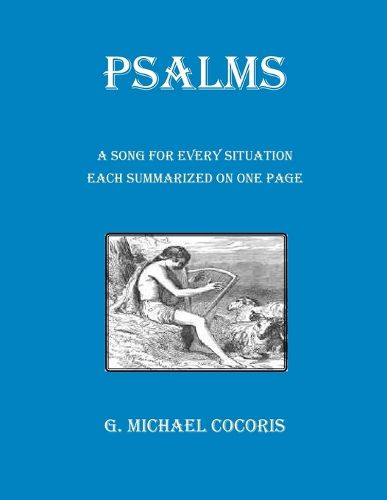Readings Newsletter
Become a Readings Member to make your shopping experience even easier.
Sign in or sign up for free!
You’re not far away from qualifying for FREE standard shipping within Australia
You’ve qualified for FREE standard shipping within Australia
The cart is loading…






This title is printed to order. This book may have been self-published. If so, we cannot guarantee the quality of the content. In the main most books will have gone through the editing process however some may not. We therefore suggest that you be aware of this before ordering this book. If in doubt check either the author or publisher’s details as we are unable to accept any returns unless they are faulty. Please contact us if you have any questions.
The book of Psalms is the hymn book of the Bible. In virtually all the psalms, the psalmist is in a specific situation. Just about every kind of situation is covered in the book. Hence, the title of this material is "A Song for Every Situation." To capture the situation of each psalm, each one is given a title that begins with "when."
By design, this treatment of the psalms summarizes each psalm in one page or less. The purpose is to explain each psalm briefly. The major way that is done is by giving an explanatory outline of the psalm. Most of what is said in the psalms is self-evident. ("Praise the Lord" needs no explanation; it just needs to be practiced.) At the same time, when the meaning of a statement or phrase is not obvious, an explanation is given. The summary statement at the end of each psalm puts the situation and what the psalmist had to say about it in one sentence.
The subject of the Psalms is praise. The Hebrew Bible appropriately entitled the book "Praises" (Our title "Psalms" comes from the LXX; it is a Greek word that means a song sung to the accompaniment of musical instruments.) The message is that God's people lament, trust God, hope in God's future blessings, and praise God.
One purpose of the Psalms is to provoke worship. Psalms is the inspired song/worship book of prayer and praise. The children of God praise God amid their doubts and fears, longings and hopes, joys and sorrows. They trust God to bless the righteous and punish the wicked.
Another purpose of Psalms is to provide prophecy. At least thirteen psalms are proven to be Messianic by New Testament quotations (2; 8; 16; 22; 31; 40; 41; 45; 68; 69; 102; 110; 118). Most would agree that other psalms undoubtedly refer to Christ as well. The future glory of Israel and of the world is also a subject of prophecy in the Psalms. However uncertain the times, the Lord will establish His kingdom through the future Messiah. That reassurance might not stabilize the time, but it will certainly stabilize the heart.
$9.00 standard shipping within Australia
FREE standard shipping within Australia for orders over $100.00
Express & International shipping calculated at checkout
This title is printed to order. This book may have been self-published. If so, we cannot guarantee the quality of the content. In the main most books will have gone through the editing process however some may not. We therefore suggest that you be aware of this before ordering this book. If in doubt check either the author or publisher’s details as we are unable to accept any returns unless they are faulty. Please contact us if you have any questions.
The book of Psalms is the hymn book of the Bible. In virtually all the psalms, the psalmist is in a specific situation. Just about every kind of situation is covered in the book. Hence, the title of this material is "A Song for Every Situation." To capture the situation of each psalm, each one is given a title that begins with "when."
By design, this treatment of the psalms summarizes each psalm in one page or less. The purpose is to explain each psalm briefly. The major way that is done is by giving an explanatory outline of the psalm. Most of what is said in the psalms is self-evident. ("Praise the Lord" needs no explanation; it just needs to be practiced.) At the same time, when the meaning of a statement or phrase is not obvious, an explanation is given. The summary statement at the end of each psalm puts the situation and what the psalmist had to say about it in one sentence.
The subject of the Psalms is praise. The Hebrew Bible appropriately entitled the book "Praises" (Our title "Psalms" comes from the LXX; it is a Greek word that means a song sung to the accompaniment of musical instruments.) The message is that God's people lament, trust God, hope in God's future blessings, and praise God.
One purpose of the Psalms is to provoke worship. Psalms is the inspired song/worship book of prayer and praise. The children of God praise God amid their doubts and fears, longings and hopes, joys and sorrows. They trust God to bless the righteous and punish the wicked.
Another purpose of Psalms is to provide prophecy. At least thirteen psalms are proven to be Messianic by New Testament quotations (2; 8; 16; 22; 31; 40; 41; 45; 68; 69; 102; 110; 118). Most would agree that other psalms undoubtedly refer to Christ as well. The future glory of Israel and of the world is also a subject of prophecy in the Psalms. However uncertain the times, the Lord will establish His kingdom through the future Messiah. That reassurance might not stabilize the time, but it will certainly stabilize the heart.